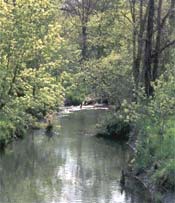 "In monastic life time is not measured by a clock. The day may be set out according to the parts of the Divine Office, a set of psalms and songs chosen according to the remembrance of the day--a saint, a liturgical season, a holy event...Qualities of time are also evoked by chants...We all have music that is tied to special times, and is therefore a means for celebrating the seasons of the soul. We could all learn from monks to disregard our watches and find other more imaginative, creative ways to mark time."
"In monastic life time is not measured by a clock. The day may be set out according to the parts of the Divine Office, a set of psalms and songs chosen according to the remembrance of the day--a saint, a liturgical season, a holy event...Qualities of time are also evoked by chants...We all have music that is tied to special times, and is therefore a means for celebrating the seasons of the soul. We could all learn from monks to disregard our watches and find other more imaginative, creative ways to mark time."--Meditations on the Monk Who Dwells in Daily Life
Perhaps the most unique and fascinating alternative to our normal way of marking time that I've ever encountered is the ECOlogical calendar, which was developed by artist Chris Hardman. Reflecting the theory of All Time, the ECOlogical calendar is a colorful, poetic and extremely naturalistic tool for marking our place in the history of the universe. On the ECOlogical Calendar, years are marked since the dawn of the universe approximately 13.7 billion years ago (that will put things into perspective). Names of the months and days of the year are given poetic names that reflect the astrological, geological and ecological phenomena that are nature's holistic signposts marking the changes of the seasons. My birthday, for example, which is on Jan. 4 on the Gregorian calendar, occurs in the month Celeste and is called "Sunclosest" in the ECOlogical calendar, reflecting the ironic phenomena that though the Northern hemisphere is cold and dark this time of year, the Earth's actual proximity to the sun is relatively close (it's the tilt of the Earth that creates the seasons; in that sense, I guess the ECOlogical calendar does reflect a Northern hemisphere bias!).
At any rate, tools like the ECOlogical calendar are useful for reframing our normal way of viewing time and nature, and help correct centuries of anti-environmental sentiment that the world's religions have unfortunately reinforced. With their emphasis on the impermanence of the physical world and the afterlife, the great religions have often left believers with a sense that nature is unimportant, even fallen or corrupt. The Franciscans offer a long-standing alternative to this anti-nature attitude, emphasizing the sacredness and sacramentality of the physical world. Such a perspective will be essential if Christian practitioners hope to maintain a relevant place in this rapidly-changing environmental context, and a relevant and centered view of humanity's place in universal time.




No comments:
Post a Comment